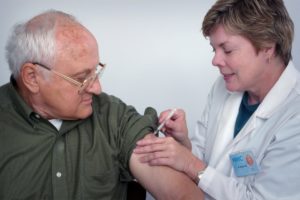Adult Failure to Thrive – About, Diagnosis and Treatment

An aging father who recently broke his hip due to a fall is now spending more time sedentary and less active – he doesn’t move as often as he did prior to the hip fracture – he may spend more time than usual laying in bed or sitting on his chair. He stops preparing meals and eats at a caloric deficit, and due to nutritional deficiency, he doesn’t have the energy to go out anymore and as a result he feels isolated and depressed. This negative snowball effect is known as adult failure to thrive (AFTT), a decline seen in elderly individuals with multiple chronic medical conditions that get in the way of their daily living, resulting in a snowball effect of poor nutrition, weight loss, inactivity, depression and decreasing functional ability.
Why it’s a problem
AFTT is a serious problem in elderly individuals, especially for those who are living alone and struggle with a chronic health condition such as Alzheimer’s or Multiple Sclerosis, because it can result in poor nutrition, lack of activity, depression, and in most cases it culminates in death.
Symptoms of failure to thrive in adults
The early symptoms of failure to thrive are often times overlooked & gradually worsen over time. It’s important to pay attention to the smallest details in one’s behavior. Generally, the symptoms are never clear and sometimes caused due to unknown reasons.
- Unintended weight loss
- Loss of appetite
- Trouble thinking or unexpected memory loss
- Depression or mood swings
- Impaired cognitive functions
- Chronic infections as a sign of weakening immune system
- Trouble swallowing
Adult failure to thrive diagnosis
Diagnosis begins with an in-depth medical review of the 3 main areas of AFTT syndrome: depression, malnutrition, cognitive and functional impairments. For example, the audit may look at the individual’s economic, spiritual, psychosocial and emotional needs and as well as some social or environmental factors; the functional ability, underlying medical conditions, and medication interaction is also taken into account when evaluating for AFTT.
Depression
Depression is the most common psychiatric condition in older adults with AFTT, and understanding whether it’s the consequence or the root cause of AFTT can play in instrumental role in the patient’s recovery & treatment of AFTT. Patients with failure to thrive are more likely to mask depression as a problem(s) related to their physical health, for example, a patient might disguise (whether willingly or not) symptoms of depression with weight loss related issues, making it harder to diagnose early on. When the diagnosis and treatment of depression is delayed, the decline & severity of symptoms of AFTT in senior patients typically become worse over time.
Malnutrition
Generally, nutrition is a very critical predictor of mortality in elderly people. The most accurate and common evidence of malnutrition in older adult patients is hypocholesterolemia and hypo-albuminemia. When patients are audited for malnutrition, doctors or nurses typically look at the patient’s diet history – including caloric intake, availability & ability to purchase food, the use of supplements, and the overall diet habits such as food intake, number of meals per day, and daily macro/micro nutrition intake. Other symptoms such as weight loss may be included in the auditing process.
Cognitive & functional impairment
In some patients, cognitive changes may occur due to delirium-induced effects of chronic health conditions such as Alzheimer’s or Parkinson’s. Some medications can trigger depression, functional incapacity, and nutritional deficiency. Evaluation includes a review of the individual’s cognitive status, social interactions, and mood. Further, doctors might look at the patient’s relationships with family, friends and caregivers, living situation, financial stability, and as well as look for symptoms of abuse or neglect if being cared for by a home health caregiver or a family member.
Failure to thrive in adults treatment
The treatment should focus on identifiable conditions such as poor nutrition and depression, and is limited in interventions that pose a health risk for the frail and elderly. The end goal of AFTT treatment is to improve the overall quality of life by focusing on nutrition, cognitive, and functional therapies & intervention. Treatment is prescribed per the individual’s unique conditions & needs, and is typically carried out by a team of medical providers such as doctor, nurse, dietician, psychiatrist, physical therapist, and a dedicated caregiver.
What can you do to help some one with AFTT?
- Considerable supervision: If the patient has a sudden decline in their health such as unwilling or incapable to successfully follow an adequate diet – i.e. they are not eating or hydrating adequately; or if they seem to experience symptoms of depression such as mood swings or loss of interest in activities they once found interesting; or any other sign of a decline in overall health, contact their medical provider (e.g. nurse, caregiver) and discuss your observation. Clarify in as much detail as you can about the patient’s current health condition, and with the help of said medical provider, make an action plan to improve the symptoms of the patient and keep them on track for recovery.
- Medications: Side effects or drug interactions that could have negative implications with AFTT are common, as such it’s important to keep a watchful eye over the types of medications the patient takes, and to report to their medical provider if the patient is taking new medications
- Diet: Inadequate nutrition and dehydration can quickly worsen the symptoms of failure to thrive in adults. Keep track of what the patient consumes on a daily basis, and as well as make sure they are meeting their caloric intake and macro/micro nutrient goals.
- Keep them active: Mental & physical activity plays an instrumental role in any AFTT treatment. If the patient is mobile, it’s recommended to spend some time outdoors (ideas for outdoor activities) for example going on walks or visiting a near by park. In terms of cognitive exercises, play a board game such as chess or monopoly.
- Communicate: Keep the patient socially stimulated as often as possible. Keep an open mind and heart when talking with the patient about their feelings and struggles.








